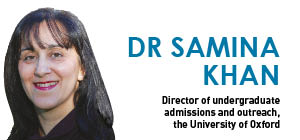The success of students from schools sponsored by Exeter University are proof the system works, says Prof Janice Kay
The University of Exeter cosponsors five schools, including one of two specialist maths schools in the country. For the university academics who lecture and mentor at the sponsored schools, removing the mystique of university is a main aim.
Sponsoring a school does not detract from Exeter’s outreach work or efforts to widen participation in the UK; in fact it enhances it and is, in many ways, a logical extension of that mission.
This week one graduate of the Exeter maths school – one of a small clutch of pupils from local authority care to gain a university place in the UK – will embark on a maths degree at Oxford. Our specialist sixth-form college sent 18 per cent of its graduates to Oxbridge last year and was placed among the top one per cent of schools in the country.
Universities are integral to the operation of maths schools. They provide intellectual challenge, stimulation and rigour and are not only accountable for their success, but provide financial stewardship of public funding, leadership and support to appoint the very best heads, teachers and administrative staff.
Universities are integral to the operation of maths schools. They provide intellectual challenge, stimulation and rigour
The involvement of universities with a maths school is more intense from the usual sort of sponsorship.
With maths schools, the university takes on the reputational risk. A sponsoring university will not just appoint governors but commit to ongoing, deep involvement in a variety of ways. Students can obtain a university certificate for projects mentored by university staff and can attend masterclasses at undergraduate level.
Students have access to university libraries, open lectures and events. The school has access to the support and expertise of the university, from press support to its network of business and industry links. The university can then recommend professional staff to lead its finance committee and engages industry leaders to sit on the board and provide strategic advice.
The Maths school was set up by the university and Exeter College, a sixth-form and tertiary college, after the government invited bids, and draws students from throughout the south-west, including some of the most deprived areas.
It has 28 boarding places, along with a means-tested bursary scheme, and takes students from some of the poorest parts of the UK. Many students are the first in their families ever to go to university and a greater number than average, 27 per cent, have disabilities or special educational needs. Last year, 36 per cent were from deprived backgrounds.

Among the students already making his mark is Charles, who is about to begin a degree at Cambridge. Neither of his parents went to university, but Charles has already been published in a peer-reviewed academic journal, and, based on his research, made a fellow of the Royal Astronomical Society.
The university’s dedication to the success of these sponsored schools does not detract from the wider work it does with local schools.
Academics and staff dedicate hundreds of hours to local schools, raising aspirations, offering advice to teachers and running innovative academic programmes for children. Classics staff teaching Latin at a Devon school in their spare time so inspired students that the school introduced Latin GCSE for the first time.
Exeter Maths school – if its results are the barometer of success – is an elite state school, but its success benefits the wider community. Since its involvement as cosponsor, Exeter College has also seen maths participation go significantly up.
The school’s teachers are specialist maths and physics teachers who can teach to a high level, but are no different from those in neighbouring schools and share their passion for their subject.
They help some local state schools develop their maths curriculum, run workshops for students, and share advice on applying to university, so schools throughout the area can benefit from their expertise.
Sponsoring a school requires commitment, dedication, time and money, and it is not without risk for a university. But the rewards are well worth the investment.
Professor Janice Kay is a provost at the University of Exeter







Your thoughts